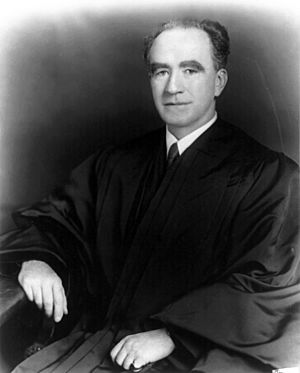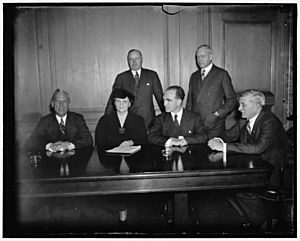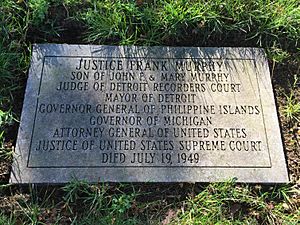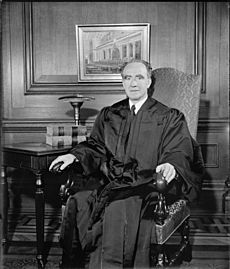Frank Murphy facts for kids
Quick facts for kids
Frank Murphy
|
|
|---|---|

Official portrait, 1940s
|
|
| Associate Justice of the Supreme Court of the United States | |
| In office February 5, 1940 – July 19, 1949 |
|
| Nominated by | Franklin D. Roosevelt |
| Preceded by | Pierce Butler |
| Succeeded by | Tom C. Clark |
| 56th United States Attorney General | |
| In office January 2, 1939 – January 18, 1940 |
|
| President | Franklin D. Roosevelt |
| Preceded by | Homer Stille Cummings |
| Succeeded by | Robert H. Jackson |
| 35th Governor of Michigan | |
| In office January 1, 1937 – January 1, 1939 |
|
| Lieutenant | Leo J. Nowicki |
| Preceded by | Frank Fitzgerald |
| Succeeded by | Frank Fitzgerald |
| 1st High Commissioner to the Philippines | |
| In office November 15, 1935 – December 31, 1936 |
|
| President | Franklin D. Roosevelt |
| Preceded by | Position established |
| Succeeded by | J. Weldon Jones (Acting) |
| Governor General of the Philippine Islands | |
| In office July 15, 1933 – November 15, 1935 |
|
| President | Franklin D. Roosevelt |
| Preceded by | Theodore Roosevelt Jr. |
| Succeeded by | Manuel L. Quezon (President) |
| 55th Mayor of Detroit | |
| In office September 23, 1930 – May 10, 1933 |
|
| Preceded by | Charles Bowles |
| Succeeded by | Frank Couzens |
| 1st President of the United States Conference of Mayors | |
| In office 1932–1933 |
|
| Preceded by | Position established |
| Succeeded by | James Michael Curley |
| Associate Judge of the Detroit Recorder’s Court | |
| In office January 1, 1924 – August 19, 1930 |
|
| Preceded by | seat established |
| Succeeded by | John P. Scallen |
| Personal details | |
| Born |
William Francis Murphy
April 13, 1890 Harbor Beach, Michigan, U.S. |
| Died | July 19, 1949 (aged 59) Detroit, Michigan, U.S. |
| Resting place | Our Lady of Lake Huron Catholic Cemetery, Harbor Beach, Huron County, Michigan |
| Political party | Democratic |
| Education | University of Michigan (BA, LLB) |
| Military service | |
| Allegiance | |
| Branch/service | |
| Years of service | 1917–1919 (active) 1942 (reserve) |
| Rank | Lieutenant Colonel |
| Battles/wars | World War I World War II |
William Francis Murphy (April 13, 1890 – July 19, 1949) was an important American leader from Michigan. He was a Democrat who held many high positions. These included serving as a Supreme Court Justice, the 35th Governor of Michigan, and the mayor of Detroit. He also served as the last Governor-General of the Philippines and the first High Commissioner to the Philippines.
Born in Harbor Beach, Michigan, Murphy studied law at the University of Michigan Law School. After serving in the United States Army during World War I, he became a federal attorney and a judge. He was the Mayor of Detroit from 1930 to 1933. Then, he became Governor-General of the Philippine Islands.
In 1936, he won the election to become Governor of Michigan. He served one term. After losing re-election in 1938, he became the United States Attorney General. In 1940, President Franklin D. Roosevelt appointed Murphy to the Supreme Court. He served on the Court until his death in 1949. Murphy is remembered for his strong support of individual rights.
Contents
Early Life and Education
Frank Murphy was born in Harbor Beach, Michigan, in 1890. His parents were Irish immigrants. They raised him in the Catholic faith. He decided to become a lawyer, just like his father.
Murphy went to the University of Michigan Law School. He earned his law degree in 1914. After law school, he worked for a law firm in Detroit.
He then joined the United States Army during World War I. He served in Europe and reached the rank of captain. After the war, he continued his studies in London and Dublin. This experience helped shape his ideas about justice. He believed in making decisions based on fairness, not just strict legal rules.
Early Career in Law and Politics
Serving as a U.S. Attorney
In 1919, Murphy became an Assistant United States Attorney for the Eastern District of Michigan. This office was very busy, especially with cases related to Prohibition. Prohibition was a time when making and selling alcohol was illegal.
Murphy was very successful in his cases. He won almost all of them. He left this job in 1922 to start his own law firm in Detroit.
Judge on the Recorder's Court
In 1923, Murphy was elected as a judge for the Recorder's Court in Detroit. This was a criminal court. He served for seven years during the Prohibition era.
As a judge, he became known for his fair trials. He was the judge in the famous trials of Dr. Ossian Sweet and his brother, Henry Sweet. These trials were about self-defense. The Sweet family, who were Black, defended their home against a mob. A famous lawyer, Clarence Darrow, defended them. Murphy's decisions helped lead to the acquittal of Henry Sweet. This meant he was found not guilty.
Mayor of Detroit During the Great Depression
In 1930, Murphy was elected Mayor of Detroit. He served during the start of the Great Depression. This was a very difficult time. Many people in Detroit lost their jobs.
Murphy created a committee to help the unemployed. This committee raised money and gave out food and clothing. In 1933, he helped start the first meeting of the United States Conference of Mayors. He was elected its first president. He worked closely with President Franklin D. Roosevelt to help cities during the Depression.
Leadership in the Philippines
Governor-General of the Philippine Islands
In 1933, President Roosevelt appointed Murphy as Governor-General of the Philippine Islands. At that time, the Philippines was a territory of the United States.
Murphy cared deeply about the Filipino people. He focused on helping farmers who struggled with land ownership. He believed in "social justice," which means fair treatment for everyone.
High Commissioner to the Philippines
In 1935, his role changed to United States High Commissioner. This new role was part of a plan to help the Philippines become fully independent. He served in this position until 1936.
Governor of Michigan

On November 3, 1936, Murphy was elected the 35th Governor of Michigan. He served for two years. During his time as governor, Michigan started a system to help people who lost their jobs. He also worked to improve mental health programs.
The Flint Sit-Down Strike
A major event during his governorship was the Flint Sit-Down Strike. This was a strike by workers at General Motors' plant in Flint. Workers stayed inside the factory to protest for better conditions. This strike was very important for workers' rights in the United States.
When violence broke out, Murphy sent the National Guard to protect the workers. He refused to force the workers out of the factory. Instead, he helped mediate an agreement between the company and the workers. This led to General Motors recognizing the UAW union. This was a big victory for unions and helped them grow much larger.
In 1938, Murphy lost his re-election bid to Frank Fitzgerald.
United States Attorney General
In 1939, President Roosevelt appointed Murphy as the 56th Attorney General of the United States. In this role, he was the chief law enforcement officer for the country.
He created a special unit in the Justice Department called the Civil Liberties Unit. This unit focused on protecting the rights of all Americans, as outlined in the Bill of Rights.
Supreme Court Justice and Military Service
On January 4, 1940, President Roosevelt nominated Murphy to be an Associate Justice on the Supreme Court. He was confirmed and sworn in on February 5, 1940. He served on the Court until his death in 1949.
During World War II, even though he was a Supreme Court Justice, Murphy still wanted to help with the war effort. He served in the Army Reserve for three months in 1942. He worked with Chief of Staff of the United States Army George C. Marshall. He retired with the rank of Lieutenant Colonel.
Important Supreme Court Opinions
Murphy wrote many opinions for the Court. He believed strongly in protecting individual freedoms and limiting the power of the government. One important opinion he wrote was Securities and Exchange Commission v. W. J. Howey Co. (1946). This case helped define what an "investment contract" is in American law.
Murphy was known for supporting the rights of many different groups. These included African Americans, immigrants, workers, and others. He once wrote, "The law knows no finer hour than when it cuts through formal concepts and transitory emotions to protect unpopular citizens against discrimination and persecution."
He is especially remembered for his strong disagreement in the case of Korematsu v. United States (1944). This case upheld the government's decision to put Japanese-Americans in internment camps during World War II. Murphy sharply criticized this decision, calling it "legalization of racism." This was one of the first times the word "racism" was used in a Supreme Court opinion.
Fighting Against Persecution
In 1944, Justice Murphy helped form the National Committee Against Nazi Persecution and Extermination of the Jews. He was the chairman of this committee. Its goal was to fight against Nazi propaganda and help rescue Jewish people in Europe. Important leaders like Vice President Henry Wallace were also part of this committee.
Death and Legacy
Frank Murphy passed away in his sleep on July 19, 1949, at the age of 59. More than 10,000 people attended his funeral in Detroit. He is buried in Our Lady of Lake Huron Catholic Cemetery in Michigan.

The Frank Murphy Hall of Justice in Detroit is named after him. It houses part of Michigan's court system. A statue called "The Hand of God" stands outside the Hall of Justice. It was created in Murphy's honor.
There is also a museum dedicated to Frank Murphy in his hometown of Harbor Beach, Michigan. It displays many items from his life and career. His personal papers and documents are kept at the Bentley Historical Library at the University of Michigan.
The University of Michigan also has a Frank Murphy Seminar Room. The University of Detroit has a Frank Murphy Honor Society. Frank Murphy Elementary School in Detroit is also named after him.
Images for kids
 | Kyle Baker |
 | Joseph Yoakum |
 | Laura Wheeler Waring |
 | Henry Ossawa Tanner |




